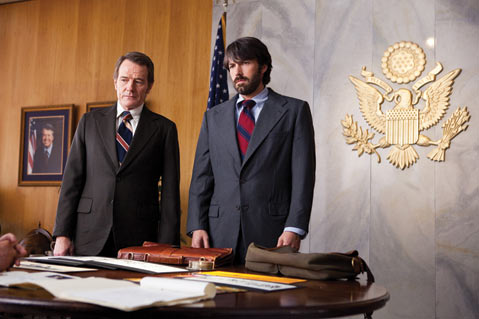Argo
Ben Affleck, John Goodman, and Bryan Cranston star in a film written by Chris Terrio, based on the article “Escape from Tehran” by Joshuah Bearman, and directed by Affleck.

Sometimes, perversely or not, the stuff of a good movie comes out of a story so bizarre it could only be torn from the pages of reality, so outlandish it sounds like a bad movie. But Argo, based on the brazen scheme for rescuing six embassy escapees in hiding during the Iran hostage crisis of 1979-81 stands as one of those classic good movies from the makings of a bad movie. Who woulda thunk that a CIA-hatched plot to peacefully liberate workers lurking in the Tehran Canadian embassy by disguising them as a location-seeking film crew could work? Furthermore, who woulda thunk the saga would translate to one of the stronger American films of 2012, 30-plus years later?
On that front, Argo is also further proof of the late-blooming talents of the once-scorned Ben Affleck, appearing here in director mode. As with his taut, suspenseful crime yarn The Town, Argo proceeds with a kind of engaging, propulsive energy, and he plays up the strange blend of Hollywood hokum and Iranian terror with a sure hand. The director also wisely restricts his role as actor to a narrow range of expressive dynamics; he seems to act best when given very little to do but show his pretty mug and mutter purposefully.
Affleck stars as Tony Mendez, the mastermind of this “best bad idea” for rescuing the trapped Americans. He enlists his friend in Hollywood, played by John Goodman, and a game director played by Alan Arkin, who insists, “If I’m going to make a fake movie, I’m going to make a fake hit.” They crank up the movie preproduction machinery, for skullduggery’s sake, and some of this film’s brightest moments involve the juxtaposition of Hollywood artifice and chilling realities across the world in Khomeini’s Tehran.
While addressing the very real tension and oppressive atmosphere in Tehran and around the world at the time, Argo also succeeds as a sharp, attentive period piece, showcasing just how different things were only three decades ago. Elements of fashion style, jumbo eyeglasses, the mod-length men’s hair, period cars, and period fonts take some of us back, and confirm what twentysomethings have heard about through secondhand sources. It also provides a tidy history lesson about the hostage-crisis era and what led up to it, shah-wise.
Ironically, considering its reel–versus–real-life themes, Argo’s downfall is the result of movie hooey and the climactic cliffhanger nonsense that chips away at the veracity of the situation earlier in the film. But after all, there is popcorn to be sold here, and this is still only a movie, albeit a very fine one.



